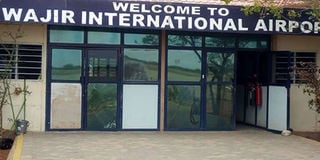Kenya bans unaccompanied luggage on aircraft from Somalia

Wajir International Airport. Kenya has reintroduced security check-ups at Wajir airport for goods coming from Somalia. PHOTO | FILE | NATION MEDIA GROUP
What you need to know:
- Kenyan officials said Somalia’s immigration checks are weak and some passengers are allowed to load luggage while they remain behind.
- Kenya’s Ministry of Foreign Affairs said there is no government policy to bar Somalis from visiting, but that those who visit must get proper visas.
Kenya’s aviation authorities on Tuesday banned unaccompanied luggage on aircraft from Somalia and insisted that all planes should land at Wajir airport for security checks.
In a letter sent to Somalia, the Ministry of Foreign Affairs said security and aviation agencies had reversed the directive on direct flights between Nairobi and Mogadishu because the latter had flouted aviation safety standards on travellers.
The letter, seen by the Nation and addressed to the Somalia ministry of Foreign Affairs and International Cooperation, said serious “security considerations” had influenced Kenya’s decision on May 10 to reintroduce security check-ups at Wajir airport, two years after they were lifted.
It said Somalia had done little to ensure the safety of passengers travelling to Nairobi.
SECURITY
Despite Mogadishu’s protests on the security checks, Kenyan officials said Somalia’s immigration checks are weak and some passengers are allowed to load luggage while they remain behind.
“It has come to the notice of relevant authorities in Kenya that passengers are allowed to travel from Mogadishu without proper documentation and visas. The ministry therefore requests that documents verification be enhanced at the port of departure,” the letter said.
On Wednesday, the ministry said any unaccompanied bags will be destroyed and airlines found carrying them punished as this contravenes international air travel safety regulations and could pose a danger to travellers.
“The government of Kenya will henceforth not allow unaccompanied baggage from Somalia into the country. Such baggage will be confiscated and destroyed in line with applicable air transport safety and security regulations and the carrier airline will be held responsible.”
ENTRY DENIED
The letter did not indicate the frequency of cases where unaccompanied bags or undocumented travellers were flown into Nairobi.
But it could add to the growing list of security restrictions Kenya is imposing on Somalia as a sea border dispute simmers.
Last week, Somalia protested the denial of entry to three senior government officials heading to Nairobi for the launch of a European Union-sponsored programme on cross-border conflict management.
The three — junior minister of Water and Energy Osman Liban and lawmakers Ilyas Ali Hassan and Zamzam Dahir — were rejected for lacking visas, though they hold diplomatic passports.
But other Somali officials with foreign passports — Gamal Mohamed, Abdi Said and Fawziya Abikar — were let in.
Somalia would later announce it will boycott future regional meetings in Nairobi, although the Nation established that subsequent different delegations from Somalia have since come to Nairobi to attend other meetings after obtaining visas in Mogadishu.
VISA
While Somalia’s Foreign Minister Ahmed Isse Awad claimed the demand for visas was an ambush, Kenya said Somali officials were taking shortcuts on a process they are aware of.
Kenya’s Ministry of Foreign Affairs said there is no government policy to bar Somalis from visiting, but that those who visit must get proper visas.
Somali officials with diplomatic passports used to get free visas on arrival, provided they carried with them authorisation proof from their parent departments.
Kenya, however, ended that privilege and officials are now required to get the visas, for free, at the Kenyan Embassy in Mogadishu before travelling.
In what could push the conflict into the international arena, Nairobi also wrote to 144 diplomatic missions in Kenya rejecting Mogadishu’s move to ban its officials from attending regional meetings in Nairobi owing to the travel hitches.
BOUNDARY DISPUTE
Kenyan officials said Somalia can choose whether to attend meetings or not, but all participants in meetings it hosts must have relevant travel documents, including visas.
“Somalia government officials are always welcome subject to entry requirements as applicable to all foreign nationals.”
The recent immigration restrictions emerged from Somalia’s refusal to discuss out of court the permanent flow of their sea boundary.
Mogadishu has insisted that the case filed at the International Court of Justice in 2014 must go on to hearing this September.
But it has also laid down a programme that will see it auction its oil blocks by November 7.
Officially, Mogadishu rejects accusations that some of the 15 oil blocks are in the disputed territory. But Kenya has contested the maps it uses.
ICJ's decisions have no option for appeal and Kenya feels Somalia abandoned tradition in the region, as countries have in the past negotiated boundary laws out of court.
Yet, for Somalia politicians, winning the case could give them the much needed ammunition ahead of their 2021 elections.





